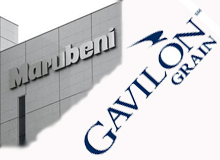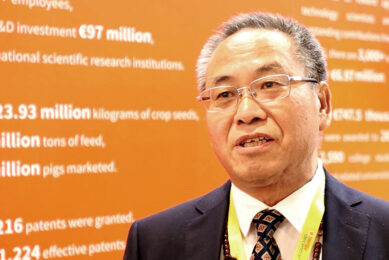Japan’s Marubeni eyes China with bid on US trader Gavilon

Japan’s biggest potential investment in US agriculture may be found in China where Marubeni has interest in buying US grains merchant Gavilon.
Marubeni, Japan’s fifth-largest trading company, is in advanced talks to buy Gavilon for about $5.2 billion including debt, a source close to the deal said early this month.
Marubeni later said it was interested in Gavilon but no decision had been made. Tokyo-based trading sources said this week that some board members may be concerned about the price tag on the deal.
Two other Japanese trading houses – the so-called "sogo shosha" who dominate Japan’s trade – have also explored a bid.
Obtaining Gavilon would deepen Marubeni’s "origination," or control of actual grain supplies, at a time when big changes in grain merchandising and use are unsettling North America, the world’s top grain exporting region.
Gavilon now has about 320 million bushels of storage in the United States, ranking third behind Archer Daniels Midland and Cargill but ahead of global giants like Bunge and Louis Dreyfus.
ADM challenge
A deal could help Marubeni challenge ADM as the biggest supplier of US grains and oilseeds to China.
Marubeni has already grown into the second-largest exporter of US grain to China, with its soybean shipments surging five-fold since 2008, based on data from trade intelligence firm PIERS.
Marubeni handled nearly 20% of China’s soybean imports in 2010, according to its annual report.
Marubeni is the best-established "sogo shosha" inside the US grain belt. In 2010 it overtook Japan’s national federation of farm cooperatives Zen-Noh as the biggest Japanese exporter of US grains and oilseeds, according to the PIERS data, and accounts for more than a third of all shipments by Japan-based companies.
The bid on Gavilon is all about the world’s fastest-growing food importer, China. Marubeni said in 2009 it signed a letter of intent with Sinograin, a Chinese state firm, to "work closely in coming years" to build state reserves and commercial grain supplies.
"There’s been a lot of effort by Japanese firms to own more of the origination capacity not just here in the US but in South America as well," Blumenthal said.
In part, the shosha may be betting that Japanese companies can make in-roads where China’s state-owned traders fear to tread.
Political sensitivities
Last autumn, China’s trading giant COFCO said it was seeking acquisitions to secure supplies in the US, Australia, Russia and South America, but it has not advanced with any major purchases although it has sent teams to various countries for discussions, sources said.
Beijing-backed firms have shied away from attempts at large US takeovers. "Chinese companies do not want to be deeply involved in the US domestic grain business because they’re well aware of the political sensitiveness of the farm sector," said Noriyuki Chino, a veteran trader and president of Continental Rice.
But Japanese traders – massive buyers of US grain for decades – are viewed no differently than a Cargill or an ADM.
Deep roots in US grain
With its subsidiary Columbia Grain commanding a growing share of Pacific Northwest exports, Marubeni has grown its US business far faster than its rivals, doubling shipments from a decade ago. But other "shosha" have a solid US reputation.
Mitsui’s United Grain Corp, formed in 1969, is now in the midst of a major expansion of its Vancouver, Washington, export terminal to ship more corn and soybeans.
Another big exporter, Agrex Inc. of Overland Park, Kansas, is owned by the biggest Japanese trading firm, Mitsubishi.
Zen-noh exports feedgrains from its own terminal in New Orleans and owns Consolidated Grain and Barge, a big shipper on the Mississippi River system, with trade house Itochu.
Zen-Noh this month set up a new venture with the biggest US cooperative, CHS Inc., to ship wheat and barley to Japan, giving CHS a new grains partner after its venture with Mitsui – called United Harvest – was dissolved at the end of 2010.
So analysts say a Marubeni transaction to buy Gavilon would be seen as business as usual in the US grain belt.
Does Gavilon fit?
A purchase of Gavilon could push Marubeni into the top ranks of global grain exporters.
Gavilon, established in 2008 when hedge fund manager Dwight Anderson led a $2.8 billion deal to buy the trading unit of food giant Conagra, grew rapidly through its base of Peavey Co elevators and through acquisitions of big grain handlers like DeBruce Grain.
Marubeni has ruled out equity financing for acquisitions, pointing to asset sales as a partial source of funding. Gavilon’s extensive fertilizer and energy trading assets would be good candidates for such sales.
Analysts say a combination of Marubeni and Gavilon makes sense commercially, with Gavilon’s presence in the central Plains and Midwest fitting in well with Marubeni’s PNW channels.
Gavilon has a port on the Great Lakes, which would boost its ability to source US and Canadian spring wheat, barley and canola.
It also buys grain in Australia for export. And unlike Marubeni, it has not made deep in-roads to China; over the past two years, it exported less than 10,000 tonnes, data show.
Marubeni with Gavilon would also be a formidable source of corn, soybeans, sorghum and other grains and oilseeds.
The rise of biofuels has intensified competition for US corn and soybeans. The opening of Canada’s prairie grains to commercial exporters with the end of the Canadian Wheat Board in August 1 has also heightened competition with acquisitions like Glencore’s C$6.1 billion purchase of Canadian grain handler Viterra.











